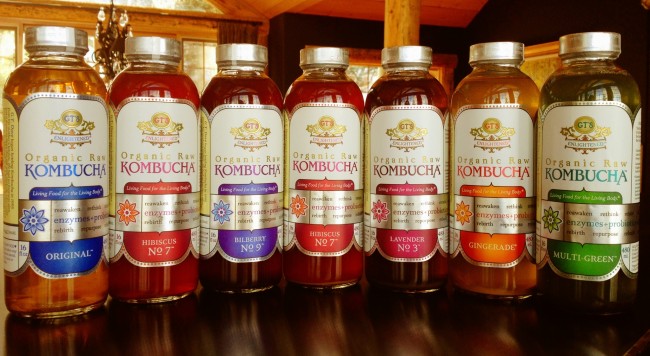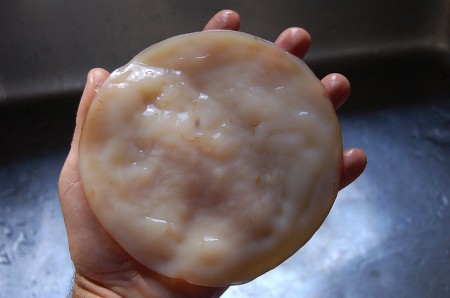
Proponents of kombucha tea claim the drink, created by certain types of fungi and bacteria that contribute to the fermentation of the tea, has anti-cancer properties and can “detox” the body. Kombucha is a type of black or green tea from the plant Camellia sinensis, that is fermented for about a week, to which certain types of bacteria, fungi and sugars are added. However, the cumulative scientific evidence as well as studies conducted in the past decade show that kombucha drinks’ risks outweigh their benefits.
According to the American Nutrition Association, kombucha is claimed to have originated in China thousands or hundreds of years ago – depending on the source – and has mystical powers to prolong life and improve health. Some even claim that drinking kombucha can treat AIDS, diabetes, obesity and a host of common diseases and disorders. However, none of these claims have been verified.
Examine.com, an independent research organization that reviews various nutritional topics and trends, recently evaluated kombucha and its claims. Although it is rich in antioxidants, there is no evidence to compare it with catechins found in green tea or vitamin C, which have been proven to help reduce the risk of cancer. Examine.com pointed out that kombucha has saccharolactone, which is a bioactive compound that is claimed to “exert anti-cancer effects in the colon.” Even though studies in rats and in vitro have shown that it may have healing properties, saccharolactone is difficult to apply in human subjects for two reasons: No human studies have ever been done on saccharolactone either in kombucha or by itself, and kombucha intake can increase the risk of death if the drink is prepared improperly. Cross-contamination during the production process can increase the growth of certain bacteria and fungi that may cause “cutaneous anthrax” and “acute renal failure,” according to a few reported case studies. With the given evidence available, Examine.com stated that there is no proven and significant benefit of drinking kombucha nor is it very practical as a health supplement, “considering there’s hardly any evidence for its health effects, but plenty of evidence for the damage it can do.”
Not all animal studies show that kombucha compounds’ benefits outweigh their risks. A study on kombucha’s healing effects on lab rats that was conducted at Tehran University’s Department of Pathology in Iran was published in 2013 in Diagnostic Pathology. Rats that were administered kombucha fungus showed better wound healing than those that were given Nitrofurazone, a type of ointment, but the results and differences “were not significant.”
Scott Gavura, BScPhm, MBA, who is a pharmacist and writer, pointed on Science-Based Medicine to a 2003 systematic review that was published in a Swiss journal
(Forsch Komplementarmed Klass Naturheilkd) that did not find any clinical trials or case series in which kombucha had any hint of medical benefits. “Based on what’s known about the active ingredients, there’s no reason to expect it would offer any medicinal effects other than the consequence of low levels of alcohol or caffeine.” Like Examine.com, Gavura listed documentation of toxicity and harm related to kombucha consumption, including hepatitis and metabolic acidosis.

Even though drinking kombucha has risks that outweigh the “benefits,” both Examine.com and Gavura agree that if people like the taste of the product, drink it wisely. Examine.com suggested that consumers purchase kombucha from “trustworthy producers with sanitary working conditions and properly trained staff” to minimize cross-contamination. Gavura said that drinking kombucha “probably won’t kill you.” Considering the lack of documented health benefits, there is no real benefit to consume it unless it is just for the taste. As with any food, Gavura suggested that people should weigh the risks and benefits. In the case of kombucha, it may not be a wise choice for some people.
By Nick Ng
Sources:
Examine.com
Diagnostic Pathology
Forsch Komplementarmed Klass Naturheilkd
Journal of Medicinal Food
American Nutrition Association




16 thoughts on “Kombucha: Studies Show Risks Outweigh Benefits”
Hey, how’s it going?
Did you hear that the powers that run this world want to put a RFID microchip in our body? It will contain not only our bank accounts but our personal information, making us total slaves to the elite. This will cause us to lose even more of our privacy.
Did you know that this RFID microchip matches perfectly with the Mark of the Beast in the Bible, more specifically Revelation 13:16-18?
“He causes all, both small and great, rich and poor, free and slave, to receive a mark on their right hand or on their foreheads, and that no one may buy or sell except one who has the mark or the name of the beast, or the number of his name…”
Referring to the last days, this could only be speaking of a cashless society, which we have yet to see, but are heading towards. Otherwise, we could still buy or sell without the mark amongst others if physical money was still currency. It’s amazing that the Bible foretold a cashless society!
Did you also hear that the Jewish people are in the process of bringing about the Third Temple prophesied in the Bible by the prophet Daniel, Jesus, and Apostle Paul? They deny Jesus as their Messiah and say their Messiah will be revealed to rule the whole world under a one world religion. They are not even hiding this information, but are actually promoting it. You can view videos about this on YouTube.
When Donald Trump made Jerusalem captial of Israel in late December 2017, the Jewish people said this was a big step for them to build this Third Temple. They even printed a Temple coin with president Trump’s face on the front with king Cyrus'(the man who built the Second Temple in the Bible) face behind him. On the back of the coin is an image of the Third Temple. They are selling these coins to raise money to build the Temple.
People have been saying for many years that the end is near, but we needed not only the Third Temple, but also the technology for there to be a cashless society for the Mark of the Beast to be a reality.
There is much more to know, please visit http://WWW.BIBLEFREEDOM.COM to see all the proof!
GOD BLESS, JESUS LOVES YOU!
I believe that you are correct with this.
Hey! I just want to give an enormous thumbs up for the good info you could have right here on this post. I might be coming back to your blog for more soon.
Thank you for your blog, not sure why these other comments are attacking you when you clearly stated a very neutral tone throughout the blog and reiterated at the end of how theres a lack of science.
For those who LOVE natural remedies should really look into the bias of thinking that whatever is natural is good for you. Same goes for thinking that everything that is chemically made is bad for you.
I do not know where you are getting your fact from, but there have been studies that this tea is extremely healthy.
Why do you say there is no research that would show the benefits? I’m asking because there is. For example an article published a year before you wrote this article. Its called: Effect of Kombucha, a fermented black tea in attenuating oxidative stress mediated tissue damage in alloxan induced diabetic rats. You should check it out.
You realize that there are no studies to speak on the benefits because big pharm doesn’t want to waste money testing “natural” remedies. They don’t make a profit on things we can make in our kitchen. I do want to point that from someone who did not know of Kombucha before today that your article is extremely negative and one sided. It presents “information” that supports your theory that the risk of drinking is higher than benefits. How much research did you conduct with actual people. People who drink kombucha and believe that there are benefits. How many deaths have occurred….what were the cirumstances? What are the side effects, how many affected? And I should note that you when you site Wikipedia more than once, your argument kind of looses ground.
Thanks, Tabitha. You can evaluate the quality of the health claims by the type of evidence available. Here’s a start.
http://sourcesandmethods.blogspot.com/2011/05/evaluating-analytic-methods-what-counts.html
Kombucha is fermented with a colony of bacteria and yeast. There is no fungus involved at all. It would be easier to accept your conclusions if you’d done your research.
http://en.wikipedia.org/wiki/Yeast
Yeast is classified in the Fungi kingdom, thus, it is a type of fungus.
“Kombucha is a fermented beverage made from tea and sugar, where the addition of inoculum and subsequent fermentation is thought to produce unique health bioactives.[1] This inoculum is commonly referred to as ‘tea fungus’ and contains a mixture of bacteria and fungi which act during the fermentation process. A pellicle which forms during this process is referred to as the ‘fungus’, and the fungus produces Alcohol which helps the bacteria produce the aforementioned bioactives.[2]
“The tea used is from the Camellia sinensis plant and usually refers to the black tea, although green tea is sometimes used. When black tea is used (as black tea itself requires fermentation to be produced) the final kombucha product is sometimes referred to as being doubly fermented.”
“The essential organisms that make up the tea “fungus” are an acetic-acid producing strain of bacteria (usually the Acetobacter genus, both and being identified) and yeast.[1] Strains of lactic acid-producting (Lactobacillus) and gluconic acid-producing (Gluconobacter oxydans being identified) bacteria can also be present.[1]
“There are various yeast fungi that are seen, including Brettanomyces/Dekkera, Candida, Kloeckera, Pichia, Saccharomyces, Saccharomycoides, Shizosaccharomyces, Torulospora and Zygosaccharomyces.[1][3] Although most have been unidentified, up to 163 strains of yeast have been detected,[1] with four major yeasts being Zygosaccharomyces bailii, T.delbrueckii, C.stellata, and S.pombe.[1]
Although kombucha contains a variety of bacteria and fungi, it appears to be safe for human consumption when properly processed and consumed in moderation (details in the safety and toxicology section).”
http://examine.com/supplements/Kombucha/
http://www.ncbi.nlm.nih.gov/pubmed/15282124
And yes, I had already done my research before writing this.
Then we should all start saying beer is fermented with fungus. I believe your choice to use the word fungus instead of yeast is intended to spin this in a negative way instead of bridging the readers understand to commonly know fermented products. You could simply say that the yeast which are part of the kombucha culture are common beer yeast and the bacteria are ones found in vinegar production as well as yogurt.
Thank you. My thoughts exactly.
This author is trying so hard to discredit Kombucha, while marketing Tyson Chicken on the website and siting Wikipedia as his resources. LOL
“Then we should all start saying beer is fermented with fungus. I believe your choice to use the word fungus instead of yeast is intended to spin this in a negative way instead of bridging the readers understand to commonly know fermented products.”
False. I am stating facts with no intention to “spin” anything in a “negative way.” Your presumption of my motive is a form of ad hominem attack – “poisoning the well.”
“The next time you hear someone else challenging the motives of another, pay attention it might mean their argument is weak. And the next time you hear yourself challenging the motives of another, consider it a sign that your opinion is probably not as well-formed as you thought.”
http://betabeat.com/2014/08/dont-poison-the-well-questioning-someones-motives-exposes-your-weak-argument/
As explained in my previous post, yeast is currently classified in the Fungi kingdom, and the species in Kombucha are from that classification. Here are two examples.
http://en.wikipedia.org/wiki/Brettanomyces
http://en.wikipedia.org/wiki/Candida_%28fungus%29
“You could simply say that the yeast which are part of the kombucha culture are common beer yeast and the bacteria are ones found in vinegar production as well as yogurt.” Perhaps I could have, and it would not change the facts that yeast is a type of fungus.
There is a difference in how a term is used in language and how one perceives it. The term “fungus” or “fungi” is used as a denotation. While it some people may perceive the word is used as a connotation of their beliefs, sometimes their projection of the usage of the word can be false. Thus, if you have a negative connotation toward a word, then you would perceive it as “negative.” Vice versa, if you have a positive or no connotation of the word, then the perception would be different.
“Fungus” used here is about the classification of yeast, no different than using the word “bacteria.”
https://www.csun.edu/~bashforth/098_PDF/06Sep15Connotation_Denotation.pdf
Thank you for a rational and balanced look at this. I have often wondered if the health claims are valid or not.
This author is trying so hard to discredit Kombucha, while marketing Tyson Chicken on the website and siting Wikipedia as his resources. LOL
Comments are closed.